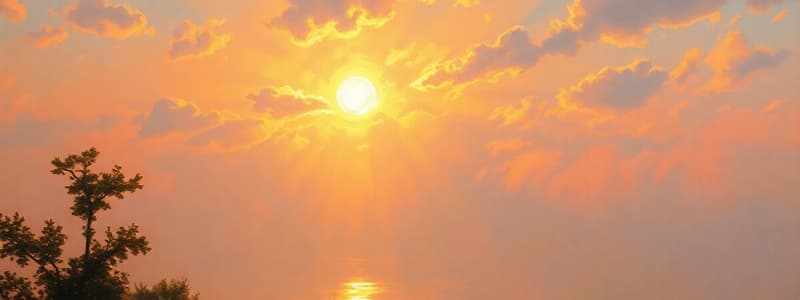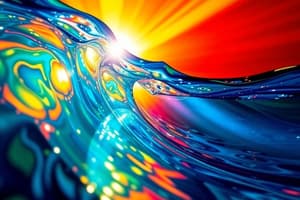Podcast
Questions and Answers
What is the process of light production that occurs when an object is heated to very high temperatures?
What is the process of light production that occurs when an object is heated to very high temperatures?
- Reflection
- Phosphorescence
- Fluorescence
- Incandescence (correct)
Which of the following materials is considered opaque?
Which of the following materials is considered opaque?
- Water
- Glass
- Wood (correct)
- Clear plastic
Which type of luminescence involves light that lasts no more than about 10 nanoseconds?
Which type of luminescence involves light that lasts no more than about 10 nanoseconds?
- Luminescence
- Fluorescence (correct)
- Incandescence
- Phosphorescence
What term is used to describe the brightness of a light source, measured in candela?
What term is used to describe the brightness of a light source, measured in candela?
Which characteristic best describes translucent materials?
Which characteristic best describes translucent materials?
How is luminous flux measured?
How is luminous flux measured?
What type of light source results from nuclear reactions in the sun's core?
What type of light source results from nuclear reactions in the sun's core?
Which of the following statements about shadows formed by opaque materials is true?
Which of the following statements about shadows formed by opaque materials is true?
What does the field of optics study?
What does the field of optics study?
Which theory describes light as a stream of particles emitted from a source?
Which theory describes light as a stream of particles emitted from a source?
Who was the first to measure the speed of light over an astronomical distance?
Who was the first to measure the speed of light over an astronomical distance?
What is the currently accepted value for the speed of light in a vacuum?
What is the currently accepted value for the speed of light in a vacuum?
What medium did Huygens theorize light travels through?
What medium did Huygens theorize light travels through?
Which of the following is NOT considered a luminous object?
Which of the following is NOT considered a luminous object?
Who was the first American to receive the Nobel Prize in Science for measuring the speed of light?
Who was the first American to receive the Nobel Prize in Science for measuring the speed of light?
Which concept contradicts the Wave Theory of light?
Which concept contradicts the Wave Theory of light?
Flashcards
Optics
Optics
A branch of physics studying light's behavior and properties, including interactions with matter and the use of light-detecting instruments.
Wave Theory of Light
Wave Theory of Light
The theory that light travels in waves, starting from a vibrating source at high speed.
Christian Huygens
Christian Huygens
A scientist who supported the wave theory, describing light's wave fronts.
Corpuscular Theory
Corpuscular Theory
Signup and view all the flashcards
Speed of Light
Speed of Light
Signup and view all the flashcards
Ole Roemer
Ole Roemer
Signup and view all the flashcards
Luminous Objects
Luminous Objects
Signup and view all the flashcards
Speed of Light in Vacuum
Speed of Light in Vacuum
Signup and view all the flashcards
Incandescence
Incandescence
Signup and view all the flashcards
Luminescence
Luminescence
Signup and view all the flashcards
Fluorescence
Fluorescence
Signup and view all the flashcards
Phosphorescence
Phosphorescence
Signup and view all the flashcards
Transparent
Transparent
Signup and view all the flashcards
Opaque
Opaque
Signup and view all the flashcards
Translucent
Translucent
Signup and view all the flashcards
Luminous Intensity
Luminous Intensity
Signup and view all the flashcards
Study Notes
Optics
- Optics is a branch of physics that studies light's behavior and properties, including its interactions with matter and the design of instruments that use or detect light.
Geometrical Optics vs. Physical Optics
- Geometrical optics deals with the reflection and refraction of light.
- Physical optics deals with interference, diffraction, and polarization of light.
Facts of Light
- Light is essential, and its absence would dramatically alter the world.
- Humans have developed various methods to produce and control light, including campfires, torches, candles, oil lamps, gas lights, and electric lights.
Wave Theory of Light
- The wave theory of light posits that light travels as waves.
- Christian Huygens explained wave fronts as perpendicular to the path of light rays.
- Wave theory suggests light originates from vibrating sources and travels at high speeds.
Corpuscular Theory of Light
- In 1704, Sir Isaac Newton countered the wave theory by proposing light travels as particles called corpuscles, also known as the emission theory.
- This theory states light particles emanate from a source and travel only in straight lines.
Speed of Light
- The speed of light is a crucial physical quantity, precisely measured in physics.
- Galileo Galilei initially hypothesized a finite speed of light, though it couldn't be proven in his time.
- Ole Roemer made the initial measurement of light's speed over astronomical distances.
- Albert A. Michelson refined the measurement, culminating in the accepted value of 2.9979 x 10⁸ m/s for the speed of light in a vacuum.
Sources of Light
- All light emanates from a source.
- Luminous objects generate their own light and often radiate heat.
- Non-luminous objects reflect light to be seen.
How Light is Produced
- Light production occurs via incandescence and luminescence.
- Incandescence is light produced from an object heated to a high temperature, such as a glowing object.
- Luminescence is light generation via processes other than heating.
Luminescence Types
- Fluorescence: Light release lasting less than 10 nanoseconds, exemplified by fluorescent bulbs.
- Phosphorescence: Light release longer than 10 nanoseconds, observed in glow-in-the-dark objects.
Light and Transparency
- Objects are categorized based on how light passes through them.
- Transparent objects allow all light to pass through. (e.g. air, glass)
- Translucent objects allow some light to pass through.
- Opaque objects do not allow light to pass through. (e.g. wood)
Shadows
- Opaque objects cast shadows, whose sharpness depends on the light source size.
Brightness of Light
- Photometry measures light illumination and brightness.
- Luminous intensity is light source brightness, measured in candelas (cd).
- Luminous flux is the luminous energy emitted, measured in lumens (lm).
Studying That Suits You
Use AI to generate personalized quizzes and flashcards to suit your learning preferences.




